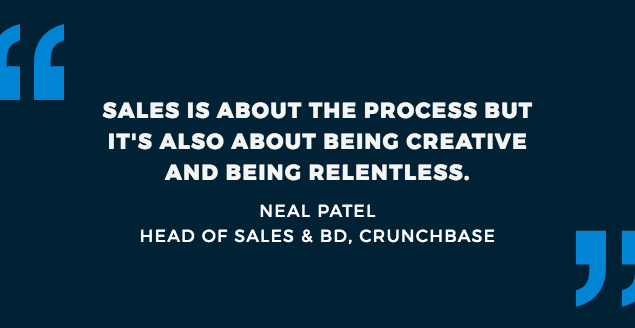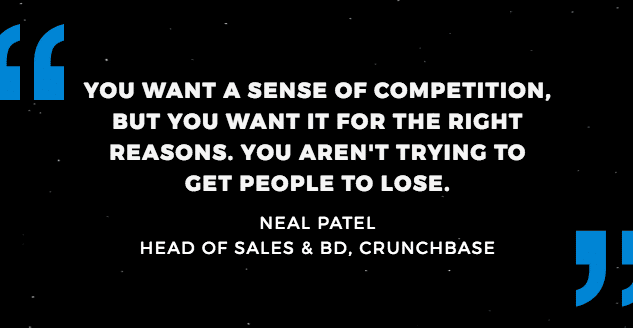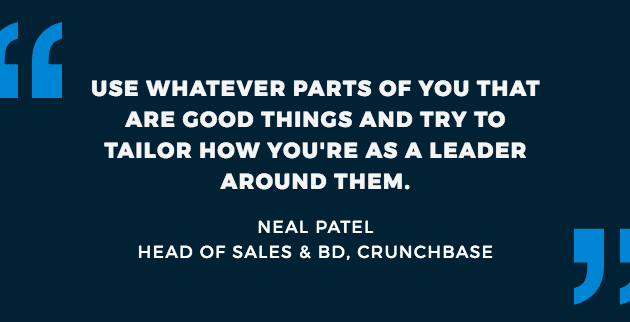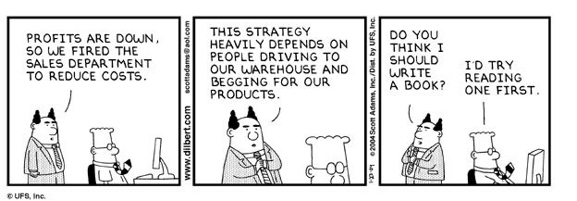Building a sales team at an early stage company can create a platform for startup success and fast-growing revenue. So how do you ensure you’re setting up a dream sales team for success?
While brainstorming who would be our source of intelligence, we realized that all we had to do was look up (literally). Our bustling sales team at Crunchbase has grown from 1 to over 15, with 100% retention rate, and month-over-month success. The star behind our sales team’s growth (plus our Business Development team) had all the answers and more.
With that, we politely forced Neal Patel, Head of Business Development and Sales at Crunchbase, to sit down with us. We picked his brain on the best practices of how to build, grow, and manage a sales team, as well as insights on being a leader at an early-stage startup.
The Makings of a Great Salesperson
“It’s a bit of both nature and nurture. You have to have something inside you that is craving that hunter mentality, you want to drum up new business, you want to cold call people, and you want to go close deals.”
But Neal admits there isn’t one set personality type that best succeeds in a sales role. He explains that “Sales isn’t just for extroverts. There are lots of introverts who excel. As a salesperson, you must believe that your product will make your prospects’ lives better. You have to get a natural satisfaction from helping others.”
“A lot of it is ‘nurture’ too. We’re constantly training, it really is like developing any other skill or training for a sport. You have to keep practicing to get better at it every day,” explained Neal.


“Sales is about the process but it’s also about being creative and being relentless. It’s getting back up after deals fall through or after you have the door slammed in your face. Ultimately, the difference between the winner and the loser is that the loser tried nine times, the winner tried that tenth time.”
Building the Sales Machine
The art of an effective sales team extends well beyond closing deals. Neal explains how a mastery of the operational side of sales needs to be established before a sales team can grow rapidly.
“Sales needs to be a machine. Particularly at an early-stage company, we’re trying to build a sales process that is scalable and repeatable. Ideally, you’re able to get to a place where the operational aspect of sales would feel like a math problem. You understand how the inputs affect the outputs and the impact of different levers.”
Managing with Empathy and Trust
“If I am hiring, coaching, and training people up the right way, then I should trust and empathize with them because otherwise, I’ve fucked up.”
To Neal, trusting his team means empathizing with not only their work lives but also their personal lives. It’s something he’s learned over years of managing folks.
“If you know your boss cares for you and trusts you to work hard, you carry that same mentality to your teammates, and ultimately the people who will one day work for you.”
Building humanity into individual relationships is imperative for a healthy team, and to integrate into your leadership style. Particularly with a small team, it is important “to figure out what to let go, trust your team is going to figure out challenges and keep an eye out for when they fall down.”
Balancing Competition and a Team Mentality in a Sales Team
Building a healthy world of competition starts with centering your team around a shared goal. When your team better understands one another, you can introduce competition while keeping a friendly and lively dynamic.
“I try to get people to interact socially so they understand that the person next to them is a human who has the same hopes and dreams as they do, and the same imperfections that we all have.”
“You want a sense of competition but you want it for the right reasons. You aren’t trying to get people to lose.” Neal emphasizes that “When you create a competitive dynamic, it’s about celebrating the winners and not necessarily punishing the losers.”


Particularly at a growing company, “You don’t want to create a culture that the bottom 10% of culture always get fired, especially if you’re hiring good people.”
A big part of Neal’s goal is to keep showing his sales team how the “pie can get bigger and bigger if we all just keep doing our jobs better and better. The underlying subtext is that the playful and healthy competition between us will encourage us to all be better.”
Hire for “Culture Add” not Culture Fit
When hiring for a startup, Neal makes sure that candidates “add to our culture rather than ‘fit’ in. I want to know what they can bring to help grow our team, and help us think from a different perspective.”
A great tip to empower his team members and ensure they hire the right people?
Neal assigns individuals to be the “captain” of a particular attribute, playing to his team members’ innate strengths.
“You have individuals on a team who are really good at certain elements of an interview. I look internally and assign team members to be my champion for a particular attribute. For example, I look to individuals to be my tenacity captain or my captain for a particular skill throughout the interview process.”
The Worst Part about Sales
“It is hard when you have people who work for you come, and say ‘I’m going to miss quota, and I’m freaking out about it. I haven’t slept in two days, are you going to fire me?’”
“Unlike most other job functions at an early stage startup, sales people’s performance is measured with extreme transparency,” Neal explains.
“Effectively, sales teams get monthly reviews. When you see the toll that takes on your team, it’s difficult. You have to make sure individuals are aware of their performance. But you have to coach them in a way that is empowering, and doesn’t further demoralize them.”
And particularly at a startup where everyone is learning, “You don’t always get it right. The balance between providing raw feedback and being encouraging can be difficult. I’ve gotten it wrong when I’ve been too nice sometimes. But I’ve also gotten it wrong where I’ve been a little too direct sometimes.”
“It’s a balancing act in some ways. They’ve come to you because they’re scared. It’s your job as a leader to get them to see some light. It’s not only coaching people up, it’s also giving them a tangible task to change or improve upon.”
Building a Learning Culture
“I always tell my team, ‘Be thoughtful, be relentless, and be better every day,’ and I expect them to help me grow and learn as well! If my team members are learning things that can make me better or meet people I should talk to and learn from, I encourage them to tell me.”
Leveraging other people’s experiences and learnings is crucial not only in a team but also outside of the team. Vulnerability and a genuine interest in learning and improving have gone a long way for Neal.
“A lot of growth is being open and not being afraid to talk to people and say, ‘Hey, I think you do this better than me, can you tell me how you do approach this?’”
The Makings of a Good Leader
The best professional advice Neal has received? The importance of being an authentic leader.
“Most smart people who are actually good people can probably become good leaders. Problems occur when they follow others’ advice on how to be a good leader when that advice conflicts with their true self.”
Neal explains how genuine interactions true to the leader’s inherent qualities are imperative to being a good leader. For example, “You may not be a hard ass. But if you start leading like a hard ass, not only will you suck at it but no one will respect you.”
“And vice versa, you may be someone who is all about the numbers, is hyper-analytical, and more of a terse person. When you start asking people about their personal lives, your team is going to wonder what you’re doing.”


“Use whatever parts of you that are the good things and try to tailor how you’re as a leader around them. Take stock and acknowledge the things that are really bad, and try not to bring those parts of you into your role.”
“I’m slowly trying to feed the good parts and starve the bad parts.”
Your Favorite Salesperson Joke
Being the overachiever that he is, Neal shared two favorite jokes:
Having a Shoe In
Two shoe salespeople were sent to a distant island to open up new markets. Three days after arriving, one salesperson called the office and said, “I’m returning on the next flight. Can’t sell shoes here. Everybody goes barefoot.”
At the same time, the other salesperson sent an email to the factory, telling “The prospects are unlimited. Nobody wears shoes here!”
The Best Violins
Three violin makers have all done business for years on the same block in a small town in Italy. After years of a peaceful co-existence, a new salesperson decided to put a sign in their shop window proclaiming: “We make the best violins in Italy.”
A salesperson at the second shop soon followed suit. They put a sign in their window proclaiming: “We make the best violins in the world.”
After thoughtful consideration, the salesperson at the third shop put a sign out simply saying: “We make the best violins on the block.”


Credit: www.dilbert.com






